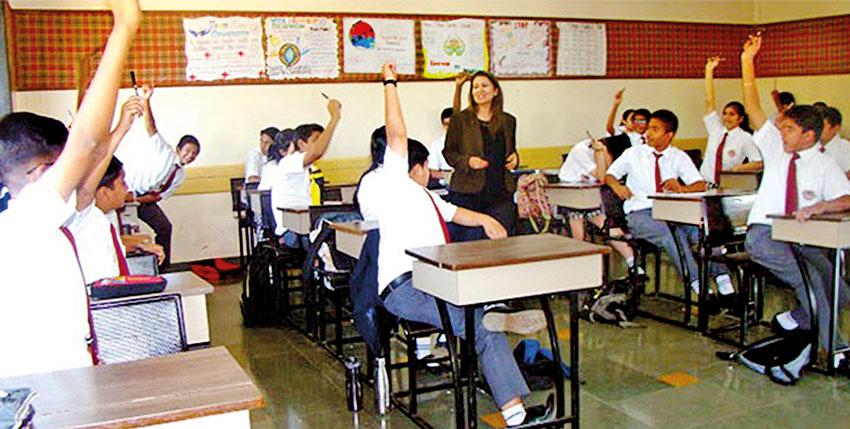Reply To:
Name - Reply Comment

Though Sri Lanka, has over 4.5 million workers/employees in the private sector compared to around 1.4 million in the state sector, the laws pertaining to the private sector are in dire need of reform
Last year, in November, local teachers of a leading international school in Colombo sent a petition to President Gotabaya Rajapaksa over alleged discriminatory treatment being meted out to them. The petition included complaints of discriminatory acts such as hiring underqualified expat teachers, harassing local teachers and not paying due incentives to local teachers.
 In this background, Daily Mirror learned this was not an isolated incident. Local teachers employed in International Schools across the island, which hire local and expat staff, face similar issues. While teachers were willing to speak about the issue, authorities seemed more content to sweep it under the carpet, or ignore and evade the issue. This indicates this is a deep-seated issue which is not being addressed, but is causing immense trauma to the teachers concerned. Though Sri Lanka, has over 4.5 million workers/employees in the private sector compared to around 1.4 million in the state sector, the laws pertaining to the private sector are in dire need of reform.
In this background, Daily Mirror learned this was not an isolated incident. Local teachers employed in International Schools across the island, which hire local and expat staff, face similar issues. While teachers were willing to speak about the issue, authorities seemed more content to sweep it under the carpet, or ignore and evade the issue. This indicates this is a deep-seated issue which is not being addressed, but is causing immense trauma to the teachers concerned. Though Sri Lanka, has over 4.5 million workers/employees in the private sector compared to around 1.4 million in the state sector, the laws pertaining to the private sector are in dire need of reform.
For example, Kalpani*, who was a teacher at a leading International School, was forced to leave her school, because the management created a situation that was not conducive for her to teach. “Every year they renew our contracts, but I didn’t receive the notification of renewal of contract. Suddenly, I received an email from the Principal informing me that I had a meeting with the head of school. At that point, I realised something was going on.” At the meeting, Kalpani was told her teaching was not up to standard and the classroom objectives had not been included in her prepared lesson plans. She was told to prepare weekly lesson plans and have them approved by the head of department, and also have regular meetings with the administration. Kalpani noted none of the other teachers had been required to put classroom objectives in their lesson plans, and that she would never have had the time to prepare for lessons or grade papers if she was to prepare lesson plans that were as detailed and included all the different information required by the administration. “I’ve had more than a decade of experience teaching the curriculum followed by the school and I am a registered and certified examiner who has been marking exam papers from all over the world. I was formally a lecturer at a state university in Sri Lanka. I have never had complaints against me throughout my career,” she stressed.
 Sri Lankans in the management and board, the discrimination was present too. In some schools, when the management had removed all the expat staff - the discrimination had stopped
Sri Lankans in the management and board, the discrimination was present too. In some schools, when the management had removed all the expat staff - the discrimination had stopped
|
|
Citing similar experiences, Ramani*, who has 20 years experience in teaching not only in Sri Lanka but also abroad, had to leave an International School as she was harassed by the administration. “The Principal would constantly criticise my teaching. It went from being professional to being personal. Once, she even criticised the pitch of my voice,” Ramani revealed, adding the administration had levelled various allegations against her and her teaching, without any evidence. Ramani had later managed to refute all allegations with evidence, but these were brushed aside, with the administration insisting that she was under-performing. “The Principal told me that I needed professional help to become a good teacher. They treated me like a newbie to teaching while I had already had years of experience and had held senior positions in other schools.”
Kalpani noted that the management would pick on a Sri Lankan teacher and continuously harass them, causing them to leave. “This happens every year. I have seen it happen to others, and the same happened to me. They put us in such a situation that we have no choice but to leave.” She had also observed how some foreign teachers would get local staff like lab technicians to run errands for them. “Local staff dare not say anything against this because of the fear of being sacked. But among ourselves, during breaks we would discuss the discrimination we faced,” she said, adding the racism she faced coupled with the way the management had treated her had made it impossible for her to continue working in the school.
Ramani further charged if an expat teacher went to the administration with an issue, they would often find recourse and be helped. “But when I went to them with an issue, the Principal told me that I was wrong in the way I was dealing with the students. Once she even told me that I was faring so poorly that she felt like taking over my class while I sat in her office. I was really surprised at the double standards,” she said.
While the concept of equal pay for equal work is in the Universal Declaration of Human Rights and also in the preamble of the 1995 National Worker’s Charter, it is regularly and openly flouted by some International Schools. For example, Ramani revealed in the school she had worked at, expat teachers were being paid around 2.5 times more than local staff. “Expat teachers are also given housing allowances, international medical cover, return air tickets,” she said, noting that in other countries expat teachers weren’t treated as such, as the salary scale was based on qualifications and experience and had nothing to do with nationality.
Sharing similar sentiments, Kalpani charged that the hired expat teachers were under-qualified and had less experience, but were paid more than their more experienced and qualified local counterparts. She charged that some expat teachers are promoted just two years after joining while longer serving, qualified local teachers are not promoted. “Within Sri Lanka, Sri Lankan teachers are discriminated.”
Drawing on her experiences working abroad, Ramani shared this was the first time she had been discriminated against. “I’ve worked abroad and haven’t been discriminated against. I had worked under foreigners and also managed teams of foreigners. Never once have I been discriminated against or harassed,” she said.
Unfortunately local teachers have no recourse to justice when faced with such situations because International Schools are not answerable to higher authorities. It can be argued that the lack of a local monitoring body and regulations on International Schools have aggravated such issues.
A large part of the problem is most International Schools come under the purview of the Board of Investment (BoI) and not under the Education Ministry. In such a backdrop, International School teachers find it extremely difficult to find recourse and justice. Daily Mirror learned the agreements signed between the school and BoI, made no specification about the salaries of local and expat staff. Salary scales have been left to the sole discretion of school authorities.
As recently as March 2020, the Sectoral Oversight Committee on National Security recommended that the Education Ministry should regulate International Schools in the country by amending the Assisted Schools Acts No. 5 of 1960 and No. 8 of 1961. As many international schools come under the purview of the Companies Ordinance, the Ministry of Education has no provision to regulate or monitor any of the schools under that Ordinance.
However, on 6 April, the Minister of Education, Prof. G.L. Peiris had stated the Government was ready to introduce new legislation to bring International Schools under the purview of the Ministry of Education and enable them to regulate these schools.
Meanwhile a labour lawyer argued that regardless of whether the school came under the purview of the BoI or not, laws governing employment relations must take precedent. He stressed in the country there was no law that guaranteed equality in the private sector. He noted that employees in the private sector have confidential salaries “Usually, we do not see an equality in salaries for people with similar experience and qualifications in the same job role,” he said, adding there was no basis for expat and local staff to have different salary scales, but there was no legal provision to facilitate equal pay. He remarked that Sri Lanka should have laws that govern equality in the workplace, especially in the private sector, and that the private sector should have laws to ensure social justice.
“Private sector employees can seek redress from Labour Tribunals against wrongful dismissals. These employees should have either undergone express termination or constructive termination - where the employer creates an atmosphere causing the employee to leave. However most prefer not to take legal action because a case takes a long time to be solved,” he said. He noted another reason employees did not take legal action was because the process was costly and it could hinder their chances of alternative employment as taking legal action against a previous employer could make future employers hesitate to hire them.
While Kalpani’s school had mostly foreigners in the management and board, it is learned that in some International Schools which had Sri Lankans in the management and board, the discrimination was present too. In some schools, when the management had removed all the expat staff - the discrimination had stopped. However, local teachers opined this was not the solution as discrimination should never take place regardless of whether there are expat staff or not. While Daily Mirror attempted to contact authorities of various International Schools in Colombo, it proved futile as authorities avoided making any comment or were not available for comment.
*Names have been changed to protect the identity of the individuals.